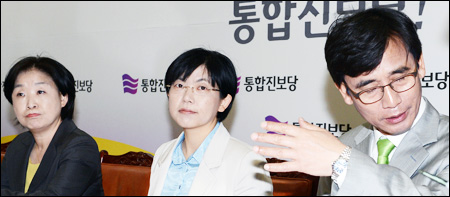Hypocrites!

Rep. Lee Jung-hee, center, co-chair of the minor opposition United Progressive Party attends a press conference at the National Assembly, Thursday, along with another co-chair Ryu Si-min, right, to issue a formal apology over the fraudulent selection of proportional representative candidates in the April 11 general elections.
Series of fraudulent acts taint credibility of leftist party
Rep. Lee Jung-hee, the baby-faced 43-year-old who jointly leads the leftist Unified Progressive Party (UPP), issued a formal apology Thursday for fraudulent candidate selection of proportional representatives in the April 11 National Assembly elections.
The party, led by Lee and three other co-leaders, which won 13 seats including six from proportional representation, is accused of being a “gang of hypocrites,” and faces a possible investigation by prosecutors over the latest vote-rigging scandal.
The activist-turned legislator said she would assume the “heaviest” political and moral responsibility for mismanaging online and offline ballots regardless of the cause of the voting fraud.
Lee, however, was short on details about how she plans to hold herself responsible.
“I have yet to receive the investigation report,” she said. “I am totally clueless as to how the vote rigging was done and which candidates were affected by it.”
Party members are feeling perplexed as to what extent she will take responsibility and how to interpret her words as she expressed discontent over the UPP’s investigation results.
Pundits agree.
Cho Kuk, a professor at Seoul National University, argued that the latest election scandal is not a matter to cover up and treat as a simple mistake.
Yang Seun-ham, a professor at Yonsei University, pointed out that the leftist party has become too lenient to its own misdeeds, as it suffers from the obsession that it must protect its party members against oppression by “dictatorial regimes.”
In other words, the leftist party’s power comes from its cleanness in its goals, and methods by which they are pursued; but the way the UPP acts shows it is “as good as” the big parties.
Rep. Lee nearly destroyed the election alliance with the main opposition Democratic United Party (DUP) for the April 11 parliamentary polls when she refused to renounce her candidacy even after being found to have defeated an incumbent DUP in a joint primary by vote-rigging.
She eventually gave up her candidacy, but it was only after a rift between the two liberal parties deepened to the level that the issue became the talk of the town, and the morality of her party questioned.
When Rep. Kim Sun-dong of the UPP set off a tear gas grenade last year to block the ruling Saenuri Party’s unilateral ratification of the free trade deal with the United States, some showed sympathy to the far-left leaning party.
At least, the UPP could come up with the lame excuse that they fought against the railroading of the contentious bill amid the lack of parliamentary democratic process.
But now, Rep Lee, who has the greatest political influence in the party, will find it difficult to convince the public and UPP members as her statements will not suffice to explain continuing election scandals.
Some mainstreamers of the UPP explained that the fraudulent voting was just a simple human mistake made due to differences in the party’s “culture and customs.”
Political experts say they appear to believe that their party is small enough to rectify its past wrongdoings without having to listen to outside criticism or en mass resignations of party leaders.
The UPP, however, is neither a small political group, nor a social entity as it produced 13 lawmakers in last month’s Assembly elections, becoming the nation’s third largest political group.
The UPP announced Wednesday after a two-week internal investigation that a computer program used for its internal online ballots had been changed several times and technical errors occurred, leading to the suspension of votes and undermining the credibility of the online ballots.
Seven UPP candidates were elected through direct elections and six others won parliamentary seats under the proportional representation system that allocates seats to parties according to the numbers of votes they receive. <Korea Times/Lee Tae-hoon>





















































